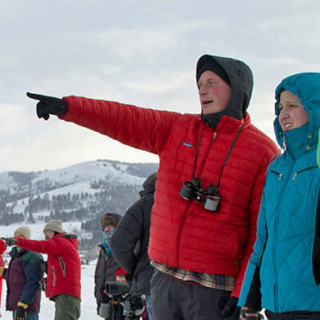Student Spotlight: Marisela Chavez

In Episode 57 of Confluence, Marisela Chavez, a Ph.D. candidate in the Department of Society and Conservation, shares about her research on the production, distribution, and preparation of food, and the perpetuation of food-related practices and how that relates to the conservation of important food crop species in Mexico.
Story Transcript
My parents live in Colima, Mexico in a small state on the Pacific coast. My family saves a lot of seeds that they've been given by other people, you know, in our family. My mom has seeds she was given by a great uncle, for example, and they'll continue planting them just because a great uncle gave it to them. And so, I got really curious about that. Like what is the role of things like heritage in perpetuating the conservation of these really important crops. It's not an easy question to answer for sure, but that's what made me start doing the project that I'm doing.
My name is Marisela Chavez, and I am a Ph.D. candidate in the Department of Society and Conservation in the W.A. Franke School of Conservation.
My research right now is about the production, distribution, preparation of food, the perpetuation of, you know, food-related practices and how that relates to the conservation of food crops species that are important and particularly species that are native to Mexico. Mexico is one of the seven Vavilov or important centers of not only diversity but domestication of important food crop species for the world. Things like maize and beans and tomatoes and squashes originated in Mexico and they're globally important today, right? We all eat them in a lot of different ways. And yet, you know, there's all sorts of pressures that are making it really challenging for farmers to continue saving seeds, to continue planting these seeds, and particularly, you know, for the landscapes where the wild relatives of these species to continue to exist.
I'm a social scientist, so I use mainly qualitative methods. I spend a lot of time talking to people. Observing, you know, everything that's going on. I'm in one community in the state of Yucatan, and then I will be moving on to a community in Oaxaca. And these are very two different types of communities, which is really exciting for this work. One is sort of--in Yucatan--you know, sea level, very homogeneous type of landscape. And then in Oaxaca, it's a community that is in the mountains and it's a different ethnic group and a whole different set of experiences. But mostly, you know, landscape is completely different. So, for my day-to-day, you know, I will go and spend time with everybody and see where they're farming and what they're harvesting and help harvest and, you know, ask some questions and see what's going on and try to understand, you know, what are the challenges that they're facing and, you know, what, what are the things that are exciting and what are they proud of and what are they concerned about? And so, my project really focuses on understanding, well, what is it that people think about their native crop species? And how does that motivate their conservation? You know, what continues to make these native crop species relevant to people? Because if we don't understand what makes them relevant, then it's really difficult to develop mechanisms or policies to support their conservation if we're not meeting the needs that people have.
So, my advisor is Laurie Yung. She is the co-chair of the Department of Society and Conservation, and she has been incredibly supportive. She has spent a lot of time doing a lot of qualitative research, right? Doing interviews, doing surveys, a lot of stuff that I do. And so, she's been really important in helping me better sort of fine tune these skills and understand, you know, what are different ways that you can open up conversations about really important topics. I'm really lucky to have the people that I have on my committee, but certainly Laurie has made a huge difference and she's, you know, the reason why I'm at UM and I'm really glad that I made that choice.
